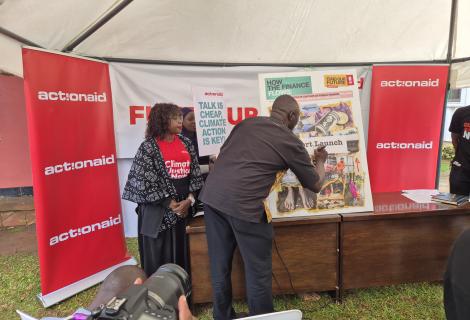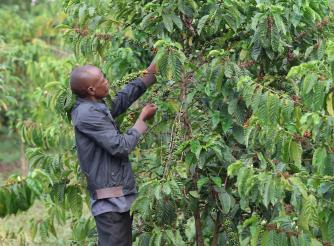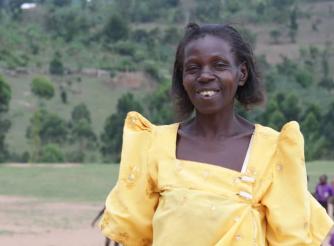Press Statement: ActionAid International Uganda Launches Ground-breaking Report on Finance Flows and Climate Crisis

On 18th September 2024, ActionAid launched a critical report titled How the Finance Flows: Corporatecapture of public finance fuelling the climate crisis in the Global South. The report examines the use ofpublic funds in the Global South and finds that the same industries that are causing the climate crisis and harming communities are also successfully squeezing Global South governments for the lion’s share of public finance. Multinationals benefiting from these subsidies include fossil fuel corporation Shell, andagribusiness giant Bayer (the parent company of Monsanto). This report amplifies AAIU’s ongoing work by exposing how public finance in developing countries, including Uganda, is being fuelled into sectors that exacerbate the climate crisis, such as fossil fuels and industrial agriculture.
Connecting the report to AAIU’s Local Efforts:
In Uganda, AAIU has been at the forefront of advocating for policy changes that address the climate crisis. AAIU played a pivotal role in the formulation of Uganda’s first-ever National Agroecology Strategy, aimed at promoting sustainable farming practices that enhance food security, environmental conservation, and ultimately reduction in green house gas emissions. Additionally, AAIU and partners, and the broader civil society sector have been advocating for the Climate Change Act which integrates finance strategy to ensure that resources are directed towards effective Climate Action. AAIU continues to promote clean energy technologies and agroecology practices at grass root level aiming at building climate resilient communities and reduce the country’s dependence on fossils fuels and industrial agriculture.
AAIU and partners have also continued to advocate for the speedy implementation of the Loss and Damage Fund - a financial mechanism to address the unavoidable and irreversible impacts of the climate crises. In 2023, AAIU and partners conducted a comprehensive study on Uganda’s readiness to implement Loss and Damage mechanisms. The study provided crucial insights into the country’s preparedness to address the impacts of climate change, including the need for robust financial strategies to support affected communities. Additionally, AAIU launched the “Fund Our Future” campaign, advocating for increased investment in climate resilient infrastructure and community-led climate solutions.
Key Findings:
- The report reveals that climate-wrecking fossil fuel and industrial agriculture sectors are squeezing climate-hit countries for over US$600 billion in public subsidies every year.
- climate-destructive sectors are benefiting from subsidies amounting to an average of US$677billion in the Global South annually, money that could pay for schooling for all sub-SaharanAfrican children 3.5 times over.
- Climate finance grants from the Global North for climate-hit countries are still grossly insufficient to support climate action and the necessary transitions. Climate finance grants amount to just1/20th of the Global South public finance going to fossil fuels and industrial agriculture.
- As a result, Global South renewable energy is receiving 40 times less public finance than thefossil fuel sector.
- While trillions of dollars in climate finance from the Global North to the Global South are necessary to adequately address the climate and development crises, Global South governments mustallocate their limited resources in ways that truly serve their peoples’ needs through climate solutionsfor food and energy.
- The report further highlights that, across Global South countries, the fossil fuel sector has beenreceiving a shocking annual average of US$438.6 billion a year in publicly financed subsidies,between 2016 (when the Paris Agreement was signed) and 2023.
Implications for Uganda:
These findings underscore the need for urgent action in Uganda to redirect public finance towards sustainable development pathways. Despite the progress made through the drafting of the National Agroecology Strategy and climate change financing strategy, there is still a huge gap in financing climate actions. By promoting clean energy technologies and agroecology, AAIU has demonstrated viable solutions that can be scaled up with adequate support.
Our Call to Action Based on the Report
- Redirect Public Finance: we call for allocations of public finance to support just transitions from fossils fuels and industrial agriculture towards people led climate solutions. This includes investing in agroecology practices and renewable energy systems that enhance food security and energy access. Scaling up of decentralised renewable energy systems to provide energy access, and gender-responsive agricultural extension services that offer training in agroecologyand adaptation.
- Global Support for Climate Action: AAIU urges wealthy countries to fulfil their commitment to providing sustainable grant-based climate finance to support global south countries like Uganda. This includes agreeing to an ambitious new climate finance goal at COP29 that reflects the scale of the challenge.
- Regulate Banking and Finance Sector: To end destructive financing, ActionAid calls for the regulation of banking and finance sectors, with standards that enforce human rights, social and environmental frameworks. There is also needed to transform international financial institutions that are pushing for climate-vulnerable countries into spiralling debt.
Note:
- The research was done in partnership with an independent research organisation Profundo.
- How the Finance Flows: Corporate capture of public finance fuelling the climate crisis in the Global South will be available online from Wednesday the 18th September 2024 here:https://actionaid.org/publications/2024/how-finance-flows- report-corporate-capture-public-finance
- This is the second of ActionAid’s annual “How the Finance Flows” flagship report
series, scrutinizing the finance flows fuelling the climate crisis.


